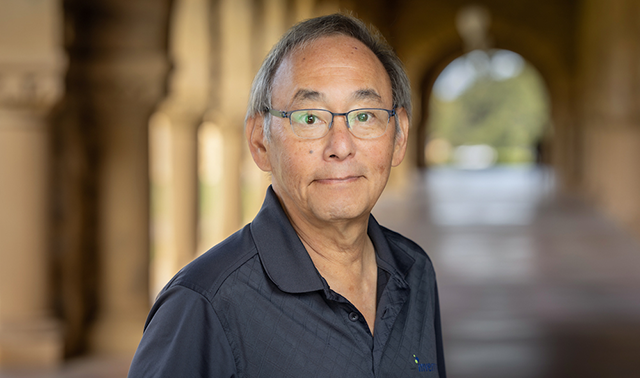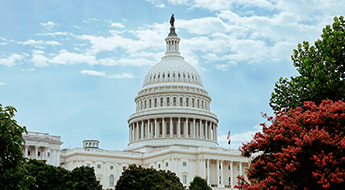Nobel Laureate Steven Chu to Discuss Path to Net-Zero Emissions in Lecture at Northwestern
Get all our news
Steven Chu is a trailblazer in bridging research and policy. We are thrilled to welcome him to Northwestern and learn from his insights on translating science into action to address the urgent challenges facing our country—and our planet.”
Andrew Papachristos
IPR Director & the John G. Searle Professor of Sociology

By 2100, the global population could reach 11 billion, intensifying the demand for energy, water, and food. How can the world meet these needs while reducing greenhouse gas emissions?
Nobel Laureate and former U.S. Secretary of Energy Steven Chu will address this critical question and more as the featured speaker for Northwestern University’s Distinguished Public Policy Lecture Series at 3:30 p.m. on Wednesday, April 2, 2025.
This in-person-only lecture will take place at the University’s Ryan Family Auditorium, 2145 Sheridan Road, Evanston, Ill. The event is free and open to the public, but registration is required.
Chu, the William R. Kenan Jr. Professor of Physics and Professor of Molecular and Cellular Physiology at Stanford University, is an acclaimed scholar, Nobel laureate, and the first scientist to serve in a U.S. cabinet position. He won the 1997 Nobel Prize in Physics for his work on laser cooling and trapping of atoms and served as the 12th U.S. Secretary of Energy under former President Barack Obama.
In his lecture, “The Challenges in Getting to Net-Zero Global Greenhouse Emissions,” Chu will summarize the current trajectory of climate change. Throughout human history, multiple industrial and agricultural revolutions have profoundly transformed the world. The unintended consequence of these revolutions is that greenhouse gas emissions are changing the Earth’s climate. Most of our energy and many of the materials we use are sourced from fossil fuels. Chu will discuss the current progress, opportunities, and challenges we must face to achieve net-zero greenhouse emissions, including food production and carbon (CO₂) capture.
This community-wide event is co-sponsored by Northwestern’s Institute for Policy Research (IPR) and the Paula M. Trienens Institute for Sustainability and Energy, with support from the Department of Physics and Astronomy.
“Steven Chu is a trailblazer in bridging research and policy,” said Andrew V. Papachristos, IPR director and the John G. Searle Professor of Sociology. “We are thrilled to welcome him to Northwestern and learn from his insights on translating science into action to address the urgent challenges facing our country—and our planet.”
“This is an exciting opportunity for researchers, students, and others in the Northwestern community to expand their understanding of these complex global challenges,” said Ted Sargent, executive director of the Paula M. Trienens Institute for Sustainability and Energy.
“The Trienens Institute is grateful to our distinguished speaker, Steven Chu, for sharing his time and insight with us, and for the partnership with IPR and the Department of Physics and Astronomy to facilitate this engagement,” added Sargent, who is also the Lynn Hopton Davis and Greg Davis Professor of Chemistry, Electrical and Computer Engineering.
For more information about the event, please email Nick Benson at ipr@northwestern.edu.
For media inquiries, please contact:
Stephanie Kulke
Arts and Social Sciences Editor
Phone: (847) 491-4819
stephanie.kulke@northwestern.edu
ABOUT STEVEN CHU
Stanford physicist Steven Chu is an acclaimed scholar, Noble laureate, and the first scientist to serve in a U.S. cabinet position. He won the 1997 Nobel Prize in physics for his work in laser cooling and trapping of atoms and was the 12th U.S. Secretary of Energy.
While leading the Department of Energy from 2009 to 2013, he established its Advanced Research Projects Agency–Energy (ARPA-E) and the Energy Innovation Hubs. In 2010, former President Barack Obama personally tasked him with helping BP stop the Macondo oil spill. He served as director of the Lawrence Berkeley National Laboratory from 2004 to 2008 when he was also a professor at the University of California, Berkeley. As a Stanford faculty member in 1988, he helped launch Bio-X, a program linking the physical and biological sciences with engineering and medicine. He has also held leadership positions at Bell Laboratories and the American Association for the Advancement of Science, and has advised the National Institutes of Health and National Nuclear Security Administration.
Chu has made groundbreaking contributions to understanding and manipulating tiny particles, driving solutions to some of the world’s most urgent challenges in healthcare, energy, and beyond. These innovations include the use of laser-based optical tweezers to manipulate biomolecules, precision atom interferometry with optical pulses of light, and single-molecule FRET of biomolecules tethered to surfaces. He is currently advancing new methods in molecular biology and medical imaging, materials science, and batteries.
He received a Bachelor of Arts in mathematics and a Bachelor of Science in physics from the University of Rochester, and his PhD in physics from the University of California, Berkeley. He holds 35 honorary degrees and is a member of nine scholarly academies, including the National Academy of Sciences.
ABOUT THE IPR DISTINGUISHED PUBLIC POLICY LECTURE SERIES
As one of the country’s top interdisciplinary social science research institutes, the Institute for Policy Research (IPR) provides a home at Northwestern University for trailblazing policy research and thought-provoking discussion. Each year, it brings in some of the world’s greatest policy minds for its Distinguished Public Policy Lecture series. From its first lecture with then-Secretary of Health and Human Services, Donna Shalala, in 1994, IPR has continued to welcome a stellar line-up of world-class thinkers, top government officials, MacArthur Genius and Nobel Prize winners, and other policy luminaries. Their discussions inspire passionate dialogue and dare faculty, students, and the wider public to imagine how, for example, we can create an equitable economy, combat entrenched poverty, or grapple with what the future of AI holds.
Published: March 27, 2025.


